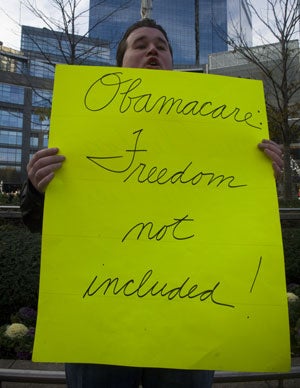The enormous storm brewing over health care in the last several years has included debate on everything from costs of care to covering the uninsured. One of the most charged issues involves moral controversies that intersect with health care.
In 2006, Heritage published a paper explaining how reducing personal control over health care decisions would burden freedom of conscience.
The paper argued that the main problem for freedom of conscience in health care “is that most Americans, as a practical matter, do not have [adequate] control over their own health care.”
Americans lack adequate control over their own health care, the paper explained, because “[t]hird-party payers—administrators of government and private health insurance plans—generally set the rules for coverage: which plans are offered, what benefits are included, and how they are funded.”
Recent Obamacare regulations issued by the Department of Health and Human Services (HHS) show the truth of these observations.
HHS has issued a rule that requires non-exempt health care plans to cover all FDA-approved contraceptives, sterilization, and related education and counseling.
On the ground that certain FDA-approved contraceptive methods can sometimes “cause the demise of embryos both after and before uterine implantation,” many institutions also believe that the rule forces them to cover abortion.
Paying for, providing, educating about, or otherwise participating in abortion, contraception, and/or sterilization violates the religious or moral conscience of many individuals and institutions. Coupled with Obamacare’s new health care coverage mandates, the HHS rule therefore represents one of the broadest attacks on freedom of conscience ever in this country.
The rule includes an exemption for religious employers. But as Heritage stated in public comments submitted to HHS in 2011, the exemption “is too narrow to accommodate properly the interests protected by First Amendment freedoms.”
Indeed, according to The Becket Fund for Religious Liberty, the exemption is based on “the stingiest definition” of a religious organization ever to appear in federal law. The definition likely would not protect many religious charities, hospitals, colleges, nursing homes, universities, and others.
The exemption also fails to protect individuals who object to enrolling in or contributing to plans that cover the morally controversial items now mandated by law.
The HHS contraceptive mandate powerfully illustrates the principle that freedom of conscience in health care goes hand in hand with more personal control and freedom of choice over health care decisions.
With this principle in mind, Heritage’s policy recommendation in 2006 remains just as sound today: “American families should be free to choose from a wide variety of health insurance options, including plans sponsored by unions, trade associations, affinity groups, ethnic and fraternal organizations, and religious and faith-based institutions.”
Providing this kind of freedom of choice in health care would reduce conflicts with conscience. Individuals and families could enroll in health plans that “reaffirm (or at least respect) their ethical, moral, and religious values.” Private employers and health insurers would also benefit.
Congress has a variety of options for fixing the particular freedom of conscience problems caused by the new HHS regulation. However, an even broader solution would be to give greater control of health care choices back to American citizens.
